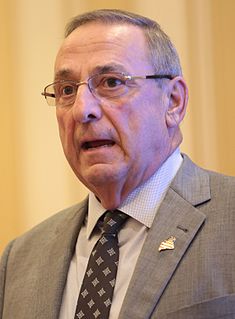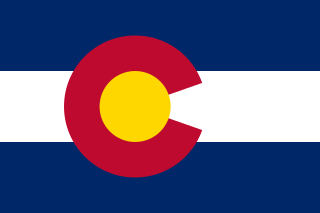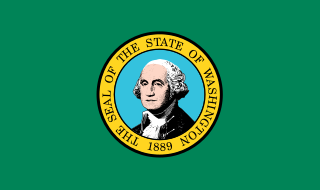
The Bangor Daily News is an American newspaper covering a large portion of rural Maine, published six days per week in Bangor, Maine.
Same-sex marriage has been legally recognized in the U.S. state of Maine since December 29, 2012. A bill for the legalization of such marriages was approved by voters, 53-47 percent, on November 6, 2012, as Maine, Maryland and Washington became the first U.S. states to legalize same-sex marriage by popular vote. Election results were certified by the Maine Secretary of State's office and the Governor of Maine on November 29.

The 2012 United States Senate election in Maine was held on November 6, 2012, alongside a presidential election, other elections to the United States Senate in other states, as well as elections to the United States House of Representatives and various state and local elections. Despite initially declaring her candidacy and being poised to easily win, popular incumbent Republican U.S. Senator Olympia Snowe unexpectedly decided to retire instead of running for reelection to a fourth term.

Maine Question 1 was a voter referendum conducted in Maine in 2009 that rejected a bill legalizing same-sex marriage in the state. The measure passed 53%–47% on November 3, 2009.

Maine Question 1 was a voter referendum on an initiated state statute that occurred November 6, 2012. The title of the citizen initiative is "An Act to Allow Marriage Licenses for Same-Sex Couples and Protect Religious Freedom". The question that appeared on the ballot was: "Do you want to allow the State of Maine to issue marriage licenses to same-sex couples?"

Maine Question 1 (MQ1), "An Act To Prohibit the Use of Dogs, Bait or Traps When Hunting Bears Except under Certain Circumstances", was a citizen-initiated referendum measure in Maine, which was voted on in the general election of November 4, 2014. As the Maine Legislature declined to act on the proposed statute, it was automatically placed on the ballot. The proposal was defeated by 320,873 "No" votes to 279,617 "Yes".

In the U.S. state of Maine, marijuana (cannabis) is legal for recreational use. It was originally prohibited in 1913. Possession of small amounts of the drug was decriminalized in 1976 under state legislation passed the previous year. The state's first medical cannabis law was passed in 1999, allowing patients to grow their own plants. The cities of Portland and South Portland decriminalized the possession and recreational use of marijuana in 2013 and 2014, respectively.

Maine Question 1, "An Act To Strengthen the Maine Clean Election Act, Improve Disclosure and Make Other Changes to the Campaign Finance Laws", was a citizen-initiated referendum measure in Maine, which appeared on the November 3, 2015 statewide ballot. As the Maine Legislature did not exercise its ability to pass the bill on its own, it was placed on the ballot and approved by Maine voters.

Maine Question 1 was a people's veto referendum that appeared on the June 12, 2018 statewide ballot. It sought to reject a law passed by the Maine Legislature that suspended the implementation of ranked choice voting, authorized by Maine voters in a previous referendum, for use in Maine elections until and if an amendment to the Maine Constitution is passed to expressly permit it; failing that, the law would be automatically repealed in 2021. It qualified because supporters of the original referendum collected the necessary number of signatures from registered Maine voters. This vote coincided with primary elections in which party nominees for governor, U.S. Senate, U.S. House, and the Maine Legislature were chosen to run in general elections on November 6.

Maine Question 5, formally An Act to Establish Ranked-Choice Voting, is a citizen-initiated referendum question that qualified for the Maine November 8, 2016 statewide ballot and was approved by a margin of 52% to 48%. It would change how most Maine elections will be conducted from a plurality voting system to a ranked-choice voting system. It appeared on the ballot along with elections for President of the United States, Maine's two U.S. House seats, the legislature, five other ballot questions, and various local elections. Maine would be the first state to use such a system for its statewide elections for governor and U.S. Senate if implemented.

Maine Question 1, "Do you want to reject the section of Chapter 399 of the Public Laws of 2011 that requires new voters to register to vote at least two business days prior to an election?", was a 2011 people's veto referendum that rejected a bill repealing Election Day voter registration in Maine. The vote was held on November 8, 2011 after being placed on the ballot due to supporters collecting the necessary number of signatures. The veto effort was successful, with 237,024 votes in favor of repeal to 155,156 against repeal.

Maine Question 4, formally An Act to Raise the Minimum Wage, is a citizen-initiated referendum question that appeared on the Maine November 8, 2016 statewide ballot. It sought to increase Maine's minimum wage from $7.50 per hour to $12 an hour by 2020, as well as increasing the minimum wage for tipped employees gradually to the same level by 2024. It would also index increases after 2024 to inflation. As the Maine Legislature and Governor Paul LePage declined to enact the proposal as written, it appeared on the ballot along with elections for President of the United States, Maine's two U.S. House seats, the Legislature, other statewide ballot questions, and various local elections. Efforts to place a competing, more moderate proposal alongside the citizen-initiated bill were unsuccessful.

Maine Question 3, formally An Act to Require Background Checks for Gun Sales, was a citizen-initiated referendum question that appeared on the Maine November 8, 2016 statewide ballot. It sought to require a background check for virtually all gun transfers in Maine, with some exceptions. As the Maine Legislature and Governor Paul LePage declined to enact the proposal as written, it appeared on the ballot along with elections for President of the United States, Maine's two United States House seats, the Maine Legislature, other statewide ballot questions, and various local elections.

Maine Question 2, formally An Act to Establish The Fund to Advance Public Kindergarten to Grade 12 Education, was a citizen-initiated referendum question that appeared on the Maine November 8, 2016 statewide ballot. It sought to increase state aid to public schools by instituting a surcharge of 3% on Maine income taxes for those with income above $200,000 a year. As the Maine Legislature and Governor Paul LePage declined to enact the proposal as written, it appeared on the ballot along with elections for President of the United States, Maine's two U.S. House seats, the Legislature, and various local elections.

The Massachusetts Legalization, Regulation and Taxation of Marijuana Initiative also known as Question 4 is an indirect initiated state statute question to legalize, regulate and tax recreational marijuana.

Maine Question 2, formally titled "An Act To Enhance Access to Affordable Health Care", is a citizen-initiated ballot measure that has qualified for the November 7, 2017 statewide ballot. It seeks to expand Medicaid eligibility under the terms of the Affordable Care Act, something which has been vetoed six times by Maine Gov. Paul LePage.

Maine Question 1, formally An Act To Allow Slot Machines or a Casino in York County, was a citizen-initiated referendum question that appeared on the November 7, 2017, statewide ballot in Maine. It sought to award a license for the construction and operation of a casino in York County, Maine by a qualified entity as spelled out in the proposed law, with tax revenue generated by the casino to go to specific programs. The wording of the proposed law effectively permitted only one company, Capital 7, to be awarded the license. The ballot measure was defeated, with 83% of voters opposing it.

Maine Question 1 is a citizen-initiated referendum that appeared on the November 6, 2018 statewide ballot. It sought to implement a tax on higher incomes in Maine to fund in-home health care services for elderly and disabled Mainers, as well as to create a government board to administer the funds. The vote coincided with general elections for governor, U.S. Senate, U.S. House, the Maine Legislature, and other local elections. It qualified for the ballot due to supporters collecting signatures from registered Maine voters.












